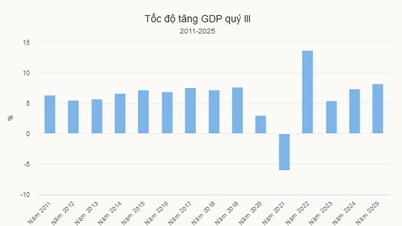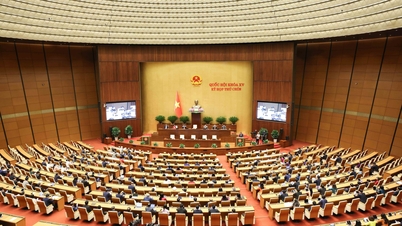Promote the healthy development of the real estate market
The importance of the Land Law is perhaps second only to the Constitution, having a profound impact on all aspects of economic and social life. National Assembly Chairman Vuong Dinh Hue has emphasized this more than once during the four sessions of the 15th National Assembly revising the Land Law.
With such importance, during the peak period (before and after the National Assembly voted) for more than a month, the Standing Committee of the Economic Committee, the Law Committee, the drafting agency and relevant agencies worked continuously from 8am to late at night to review and technically complete the 260 articles of this law.
“The completion of the Draft Law was done so carefully that sometimes it took an entire evening to review only one of the 260 articles,” National Assembly Chairman Vuong Dinh Hue shared with the press.
On the eve of the Lunar New Year, National Assembly Chairman Vuong Dinh Hue signed to certify the new Land Law, consisting of 16 chapters and 260 articles.
 |
| The contents of the Land Law are highly appreciated by the people and the business community. (Source: Batdongsan.com.vn) |
Following the process of policy development as well as technical completion of the Land Law, Dr. Hoang Minh Hieu, Standing Member of the National Assembly's Law Committee, said that with the synchronous promulgation of the Housing Law, the Real Estate Business Law and the Land Law, including breakthrough regulations, removing obstacles in the real estate market, people and businesses expect to create a transparent and synchronous legal environment, promoting the stable and healthy development of the real estate market.
“The contents of the Law are highly appreciated by the people and the business community. Some even say that the new Land Law, along with the Housing Law and the Real Estate Business Law, are the best laws in this field in recent terms,” said delegate Hieu.
However, according to Mr. Hieu, because the new laws take effect from 2025, the real estate market in 2024 may be affected by the wait-and-see mentality of investors and homebuyers. On the other hand, to put the provisions of the laws into practice, it is necessary to issue a series of decrees and circulars detailing and guiding their implementation. Therefore, the positive impact of these laws on the real estate market may only come in the last months of 2024.
However, according to Mr. Hieu, there is reason to hope that when these laws come into effect, they will promote the healthy development of the real estate market, contributing to the use of land resources for socio-economic development, meeting the expectations of the business community and people.
Contribute to reducing the consequences of cross-ownership in banks
While the restructuring of weak banks is still too sluggish, the SCB Bank "bomb" exploded at the end of 2022, making the process of amending the Law on Credit Institutions more difficult. One of the reasons why the approval had to be postponed from the 6th Session (November 2023) to the Extraordinary Session (January 2024) is that the regulations on early intervention, support for credit access to banks under special control and special control measures are not convincing enough to the National Assembly deputies.
According to National Assembly Chairman Vuong Dinh Hue, the goal of this amendment to the Law on Credit Institutions is to build a healthy banking and credit institution system, ensure system safety, increase resilience, and withstand internal and external shocks to the economy.
Dr. Trinh Quang Anh, Chairman of the Vietnam Interbank Market Research Association (VIRA), said that the Law on Credit Institutions 2024 will certainly have a great impact on the system of internal documents. That is, the organization and specific activities of credit institutions, especially related to 3 groups: administration - operation - control; credit risk management (cases of credit restriction, credit limit, related groups...); credit granting activities for credit institutions.
In addition, the implementation of the new Law on Credit Institutions also has an impact on some contents such as operating licenses, licensing procedures; increasing the time to hold real estate due to debt settlement. The addition of regulations on financial management, accounting (Chapter VIII), regulations on early intervention (Article 143, Chapter IX), or improving regulations on special control (Chapter X), regulations on mass withdrawals, special loans (Chapter XI) ... are also regulations that are expected to gradually fill legal gaps so that banks can operate more healthily.
 |
| With the new Law on Credit Institutions, banks and credit institutions will operate healthily. (Source: Agribank) |
The most sensitive impact of the Law on the operation of the credit institution system, according to the Chairman of VIRA, can be mentioned in the group of regulations on share ownership limits. Specifically, an individual cannot own more than 5% of shares (as stipulated in the current law), an organization cannot own more than 10% (currently 15%) and a group of related shareholders cannot own more than 15% (currently 20%) of the charter capital of a credit institution.
This change does not apply retroactively, with shareholders exceeding the limit being able to maintain their current ownership and gradually reduce their limit over time through 2029.
The Law also extends the concept of related persons of a company or credit institution to the subsidiary of the subsidiary, the parent company of the parent company and related persons of an individual to all family members of three generations, both paternal and maternal.
When the above regulations are strictly complied with, it is expected to significantly limit the ability of a group of shareholders to seek to own a majority of shares, thereby contributing to minimizing the consequences of cross-ownership and manipulation of credit institutions' operations (as in the case of SCB Bank).
Also having a huge impact on the credit institution system is a group of new regulations on credit restrictions, credit limits, and related groups. Specifically, the credit limit for a customer and a customer group is adjusted down from 15% (for a customer) and 25% (for a related customer group) of the credit institution's equity capital at present to 10% and 15% according to the roadmap until early 2029. For non-bank credit institutions, this ratio is reduced from 25% and 50% of equity capital to 15% and 25% by 2029.
This change is intended to help reduce the risk of credit concentration for credit institutions. However, the unintended impact may be that it makes it difficult for some large enterprises with high demand for loans (although there is a roadmap for reduction).
Accordingly, to minimize the above difficulties, it is necessary to develop a more balanced financial market, especially the stock and bond market, so that businesses can mobilize more medium- and long-term capital from this channel, reducing excessive dependence on the banking system as it is now.
Another group of regulations with quite sensitive impacts, according to Dr. Trinh Quang Anh, is related to the Law creating a framework for a number of new activities suitable for the digital transformation trend, such as online lending, electronic transactions, testing mechanisms (sandbox) for fintech in the banking sector...
“Although the mentioned regulations are still quite general and in the early stages, there are no regulations for purely digital banks (100%, without headquarters, without documents...) as some Southeast Asian countries have done, but it is necessary to acknowledge a real trend that the financial technology revolution is and will strongly change traditional banking activities. This development requires gradual legalization to create an environment to promote development, while controlling potential risks,” commented Mr. Trinh Quang Anh.
(according to Investment Newspaper)
Source


![[Photo] Chairman of the Hungarian Parliament visits President Ho Chi Minh's Mausoleum](https://vphoto.vietnam.vn/thumb/1200x675/vietnam/resource/IMAGE/2025/10/20/1760941009023_ndo_br_hungary-jpg.webp)


![[Photo] Solemn opening of the 10th Session, 15th National Assembly](https://vphoto.vietnam.vn/thumb/1200x675/vietnam/resource/IMAGE/2025/10/20/1760937111622_ndo_br_1-202-jpg.webp)

![[Photo] The Steering Committee of the 2025 Fall Fair checks the progress of the organization](https://vphoto.vietnam.vn/thumb/1200x675/vietnam/resource/IMAGE/2025/10/20/1760918203241_nam-5371-jpg.webp)









































































































Comment (0)